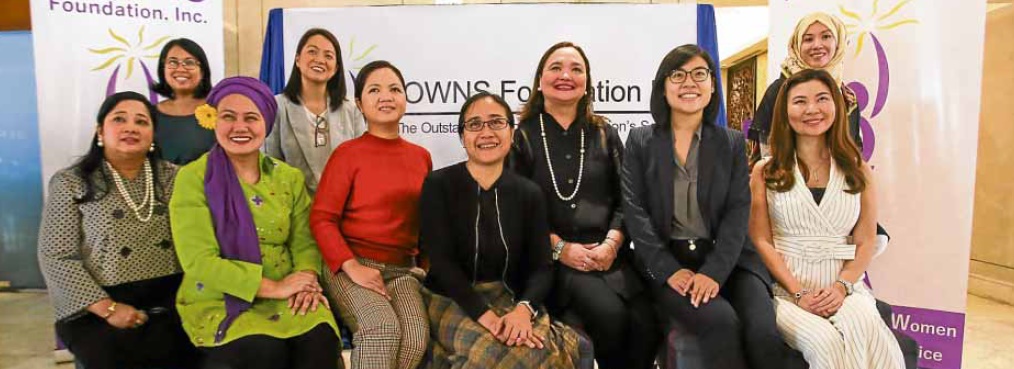TOWNS awardees affirm womanhood amid misogyny

MAKING AN IMPACT TOWNS awardees for 2019 (front row, from left) Patricia Ann Prodigalidad (law), Samira Gutoc (peace and
development), Gay Jane Perez and Regina Justina Estuar (science and technology), Karla Patricia Gutierrez (arts), Stephanie Sy
(entrepreneurship), Geraldine Zamora (health and medicine), and (standing, from left) Carmina Bayombong (entrepreneurship),
Chiara Zambrano (journalism) and Rohaniza Usman (education). —LYN RILLON
Amid the stubborn threat of misogyny and violence diminishing their self-worth, the challenge for women is to uphold their “fullness and wholeness” as human beings.
This was the message of the 12 Filipino women who on Thursday were named The Outstanding Women in the Nation’s Service (TOWNS) this year.
The title, conferred by the eponymous national organization of women leaders, is given to outstanding Filipino women who “have served as catalysts, role models and are making a positive impact on national development.”
But “the things that we do as women and as leaders go beyond politics,” said Moro advocate Samira Gutoc, who ran as an opposition senatorial candidate in May’s midterm polls and was also named among the TOWNS awardees for 2019, for her extensive peace and development work in the Bangsamoro region.
“[They are] reminders that we are whole, people who have love [for] their country but also who have other things that matter as well,” she said.
Article continues after this advertisementGutoc joins the distinguished roster of more than 166 women recognized by the foundation since its inception in 1974.
Article continues after this advertisementAlso awarded this year were Xyza Bacani (humanities); Carmina Bayombong (entrepreneurship); Clarissa Delgado and Rohaniza Usman (education); Regina Justina Estuar and Gay Jane Perez (science and technology); Karla Patricia Gutierrez (arts); Patricia Ann Prodigalidad (law); Stephanie Sy (entrepreneurship); Chiara Zambrano (journalism) and Geraldine Zamora (health and medicine).
Tone
The award, given every three years, also coincided with the third year of President Duterte’s administration.
Mr. Duterte has been criticized time and again by women’s groups for his controversial remarks against women.
For them, his statements set the tone for the challenge today to help lead women to empowerment.
“It’s very strange because on the surface, we all get to do our jobs, we all get to live the lives we want, and there is a perception that everything is OK,” said Zambrano, a multiawarded broadcast journalist and documentary filmmaker known for her work focusing on conflict-ridden areas and on the West Philippine Sea, among other pertinent topics. “But the problem [manifests itself] in normal conversations: in the jokes that people laugh at, the people say to you on the side.”
Because of the nature of her work, Zambrano is often at the receiving end of remarks that men never have to endure: whether she is afraid, and to watch what she wears and where she sleeps.
“These questions are borne out of concern, but to me it’s a constant reminder that women are considered the weaker sex, expected to choose the more comfortable and convenient path,” she said.
Prejudice
Bayombong, who founded and now leads InvestEd that provides loans to college students deemed risky by the financial system, said the deep-rooted prejudice against women also extended to the financial sector.
The “cutthroat world” of fintech, she said, is often a hostile environment, especially for mothers who cannot be expected to work 12 to 16 hours a day.
The same goes for young female customers, particularly teenage mothers, who are often deemed liabilities by lenders and therefore discriminated against.
“It’s a standing challenge in the industry… it’s so easy to fall behind,” she said.
But women, said Usman, are essential to nation-building because they help bring new perspectives to some of the country’s worst ills.
A Maranao development worker who helped establish schools in conflict-ridden areas, Usman said women could help bring “long-term, proactive and strategic programs to empower our children and nurture the seeds of peace.”
“It’s a matter of really voicing out whatever you want to say, to give voice to what the lumad and the indigenous peoples are experiencing,” Usman said. “I’ve been vocal and strong about a lot of things, and I’m really serious about peace-building as an inclusive thing where no one gets left behind, especially women and children.”